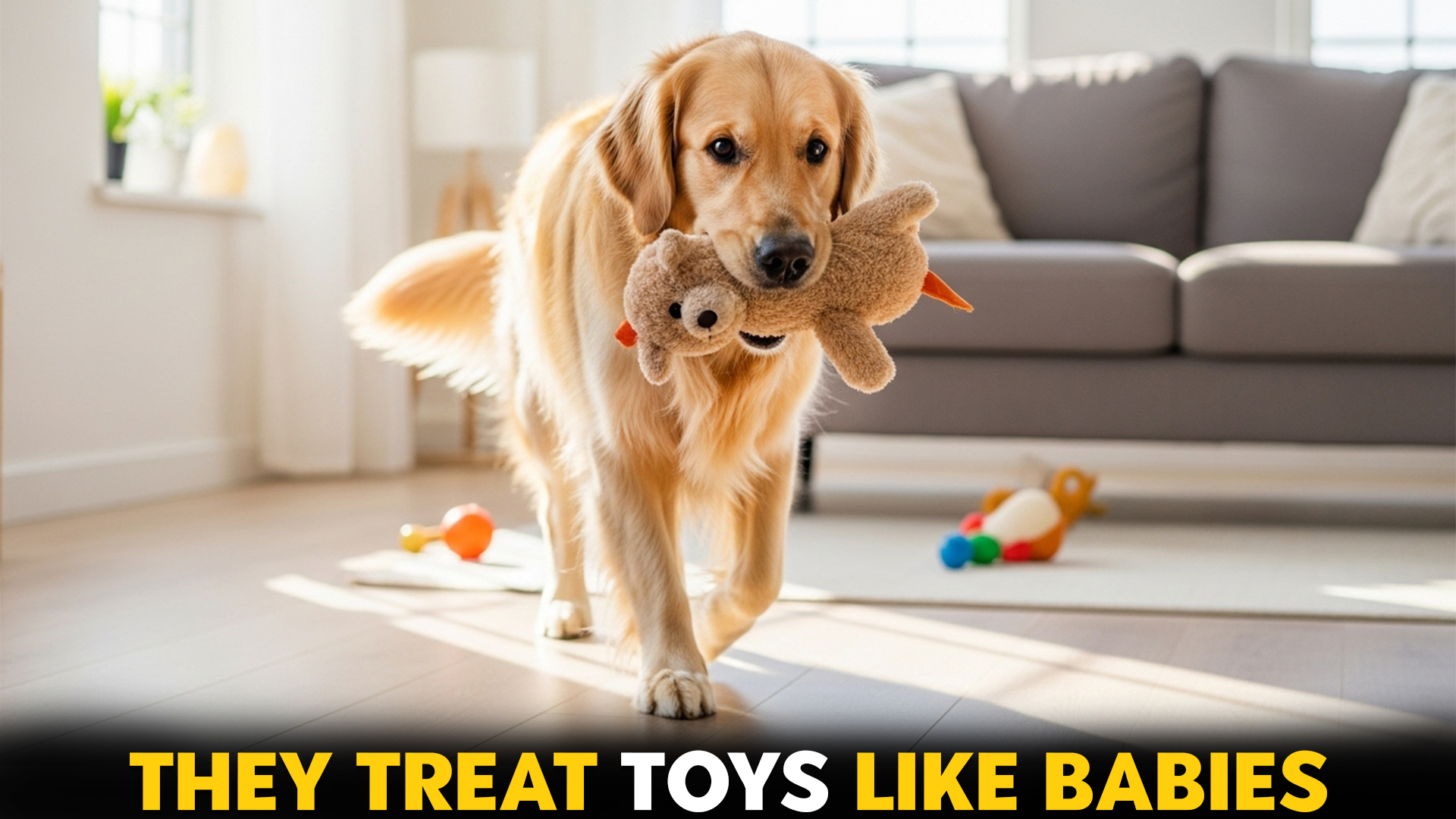Did you know that many dogs form emotional attachments to their toys, according to a study by the University of Bristol’s School of Veterinary Science? That’s right — for many pups, toys aren’t just playthings; they’re comfort objects, companions, and sometimes, “puppy substitutes.”
If you’ve ever seen your furry friend gently carrying a stuffed animal in their mouth, you’ve witnessed something truly heart-melting. It’s their way of showing care, security, and affection.
Some affectionate dogs even tuck their toys into bed or parade them proudly around the house like prized possessions. It’s both endearing and fascinating to watch!
This behavior isn’t random — it’s deeply tied to instinct, nurture, and breed personality. Some pups are just natural “toy parents.”
In this blog, we’ll meet 7 adorable dog breeds that treat their toys like precious puppies — guaranteed to make your heart melt and your smile grow.
Dog Breeds That Carry Toys Around Like Baby Puppies
1. Golden Retriever
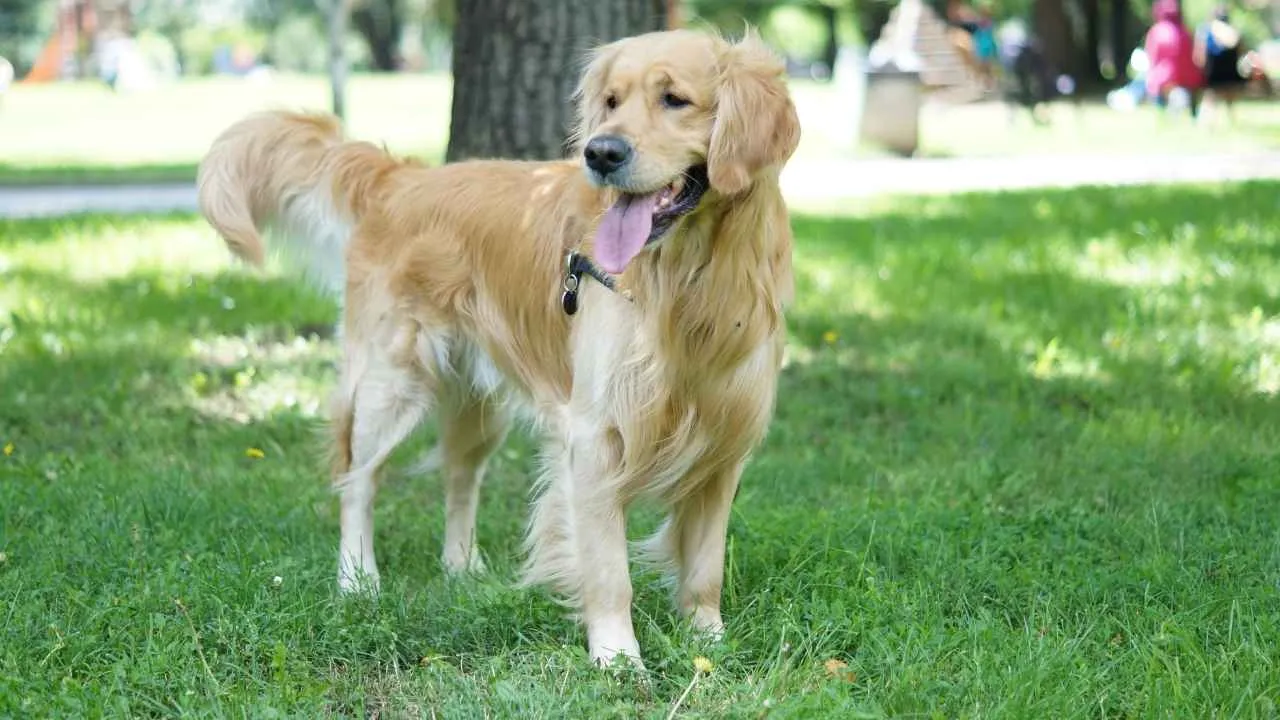
Golden Retrievers are natural nurturers — it’s in their DNA. Originally bred to retrieve game without damage, they have what’s called a “soft mouth.” This instinct translates into carrying toys tenderly, often cradling them like newborns.
According to the American Kennel Club (AKC), their calm temperament and emotional intelligence make them one of the most affectionate breeds.
Sometimes, this toy-carrying habit stems from their need to nurture or relieve mild stress. It’s not usually a behavioral issue but rather a comforting ritual.
Signs Your Golden Thinks Their Toys Are Puppies:
Carries toys gently in their mouth
Whines softly while holding them
Takes toys to bed or “hides” them safely
Their loving instincts make them endlessly gentle. Owners should let them express this adorable behavior — just ensure toys are safe, plush, and non-toxic for worry-free snuggling.
2. Labrador Retriever
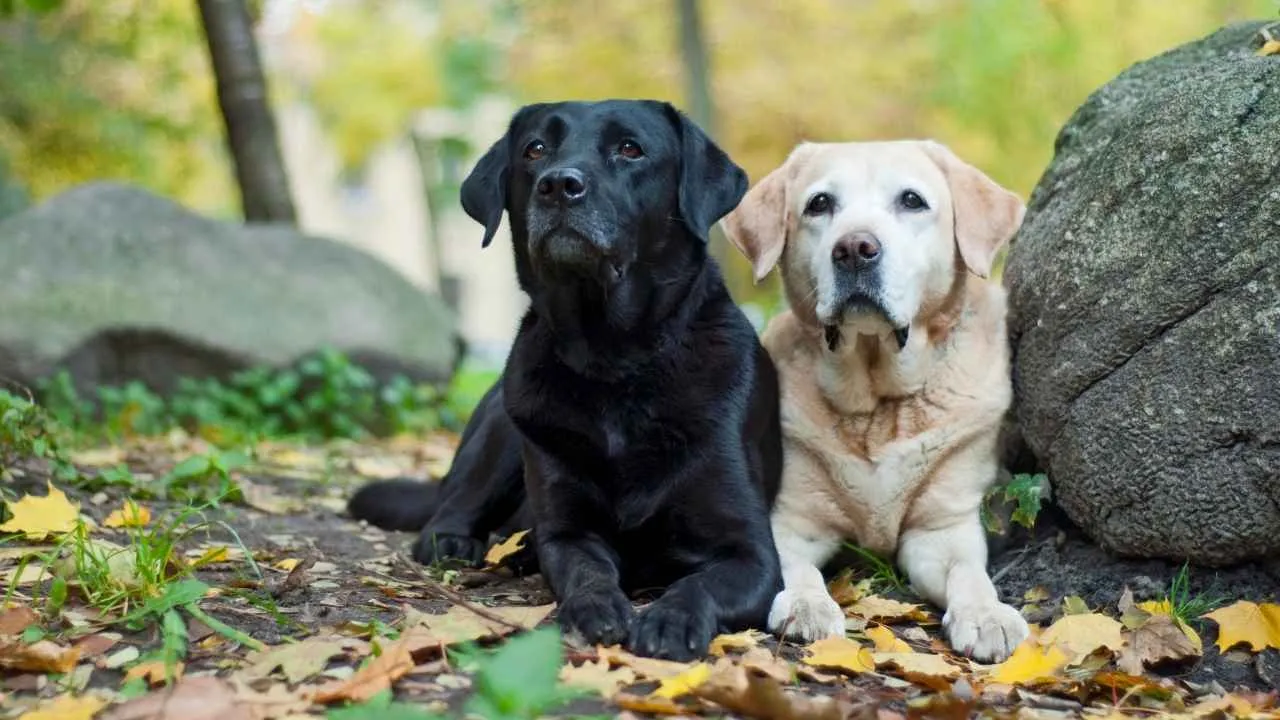
The Labrador Retriever, America’s favorite family dog, has an irresistible tendency to carry toys around like treasures.
This behavior traces back to their heritage as retrievers — bred to bring waterfowl back unharmed. Their brains associate soft carrying with reward and affection, making toys their “safe zone.”
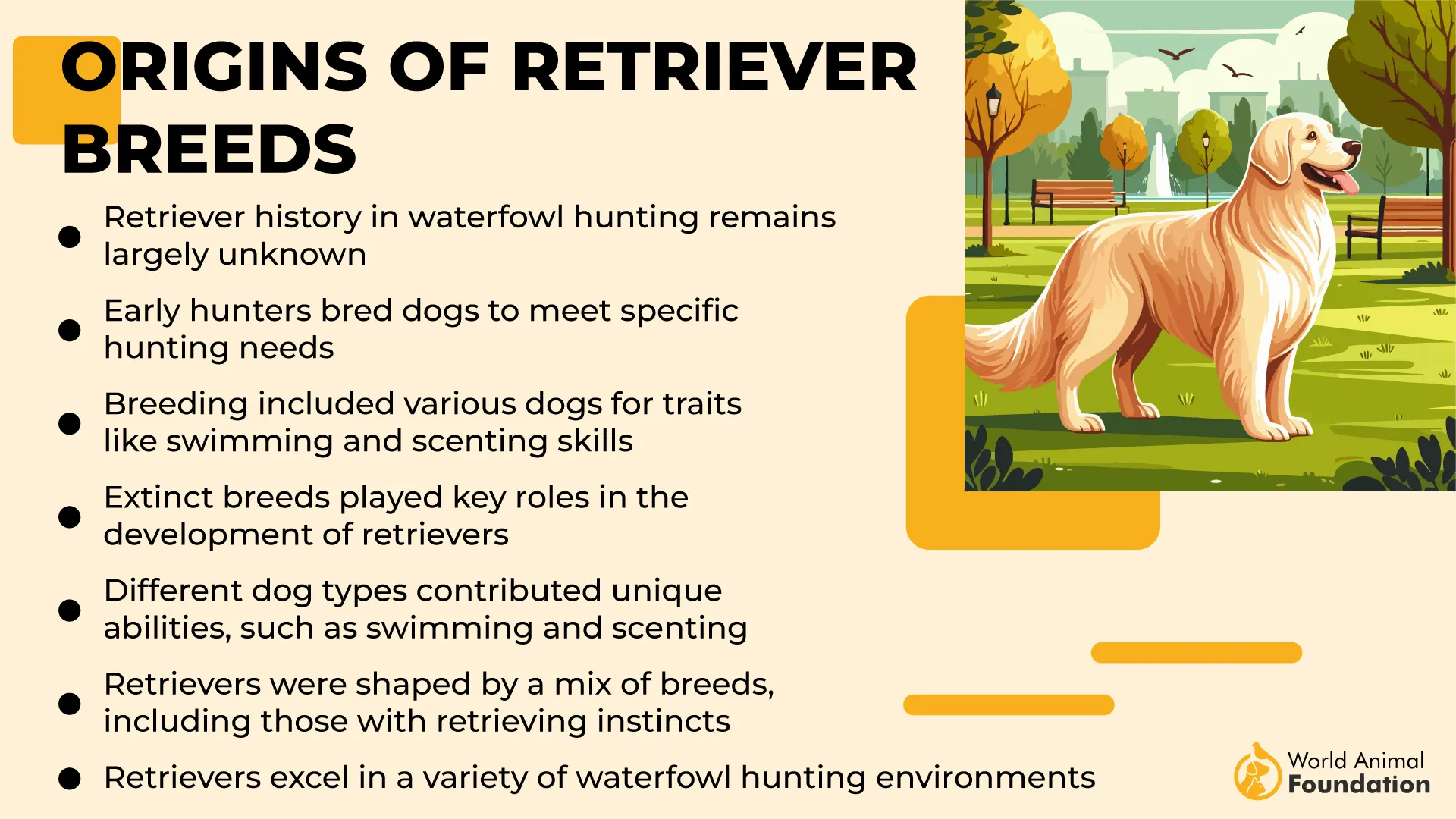
Labradors often exhibit toy-carrying when they’re seeking comfort or connection. It’s not a sign of insecurity; rather, it reflects their affectionate, people-pleasing nature.
Signs Your Lab Thinks Their Toy Is a Puppy:
Holds a toy gently during downtime
Greets you at the door, carrying a favorite plush
Keeps one “chosen” toy they won’t share
Labs are playful, nurturing souls who thrive on companionship. Encourage this sweetness by offering rotating toys and positive attention. Just make sure their playtime doesn’t turn possessive — sharing is part of their charm!
3. Poodle
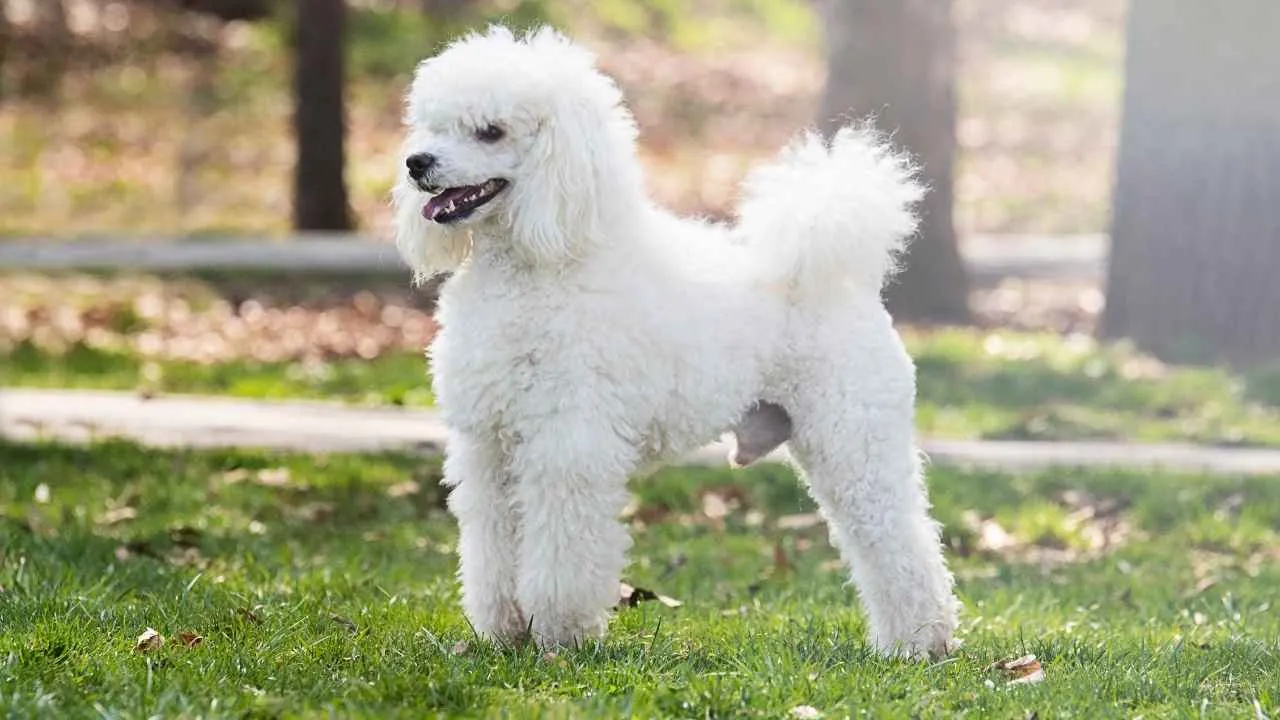
Poodles are brainy, sensitive, and full of heart. Their tendency to carry toys like babies often reflects high emotional intelligence.
A 2021 Animal Cognition study found that Poodles rank among the top five breeds for empathy and human bonding, which may explain their protective behavior toward toys.
Sometimes, a Poodle’s toy-carrying is about routine or self-soothing — especially if left alone too long. It’s rarely a sign of distress, but consistent companionship helps maintain balance.
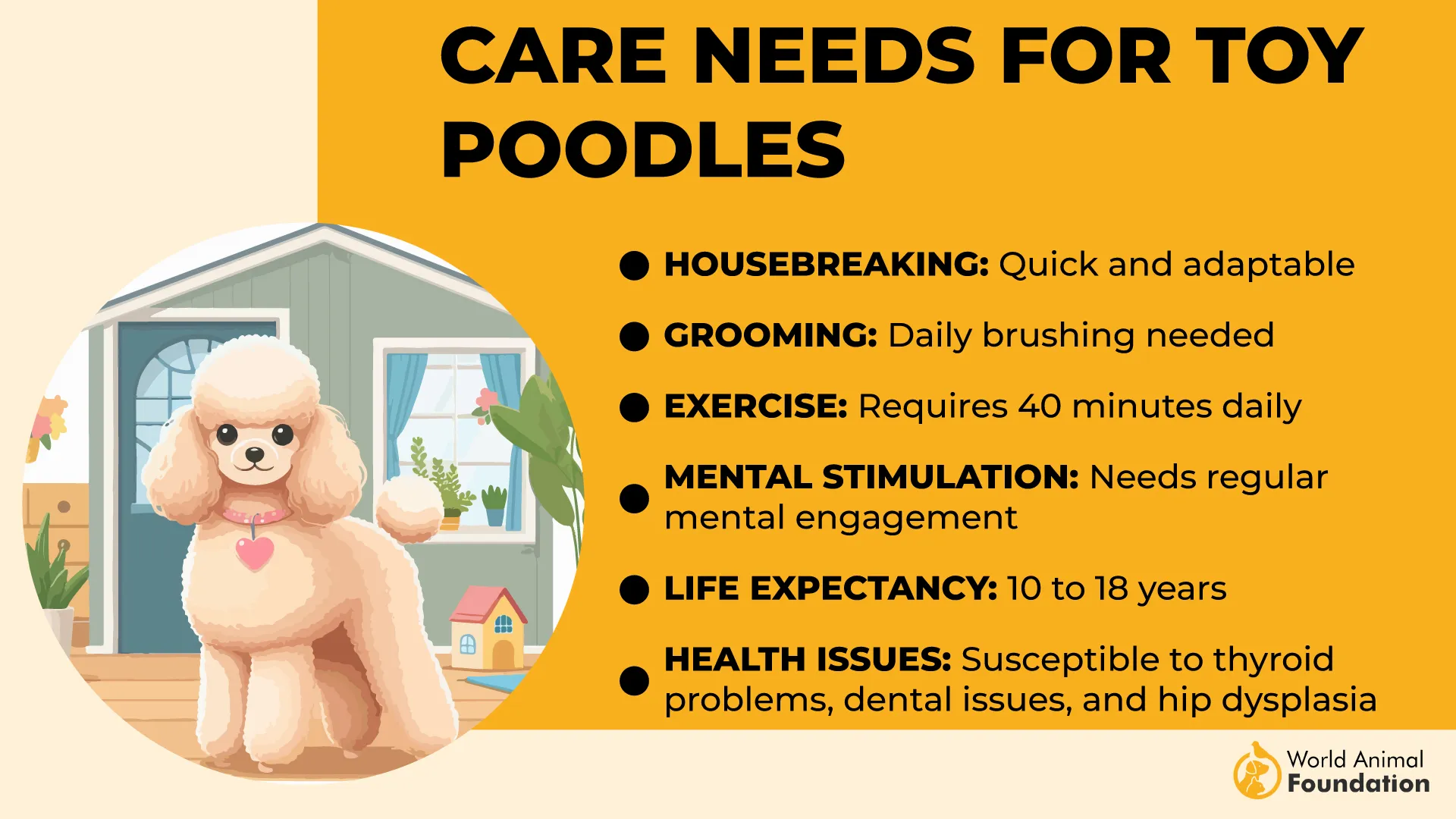
Signs Your Poodle Thinks Their Toy Is a Puppy:
Picks one favorite toy and guards it lovingly
Nudges or “checks on” the toy
Cries if the toy is missing
With their nurturing instincts and clever minds, Poodles bring both brains and tenderness to playtime. Let them mother their “babies,” but encourage social play too — it keeps their brilliant minds happy and hearts content.
4. Shetland Sheepdog
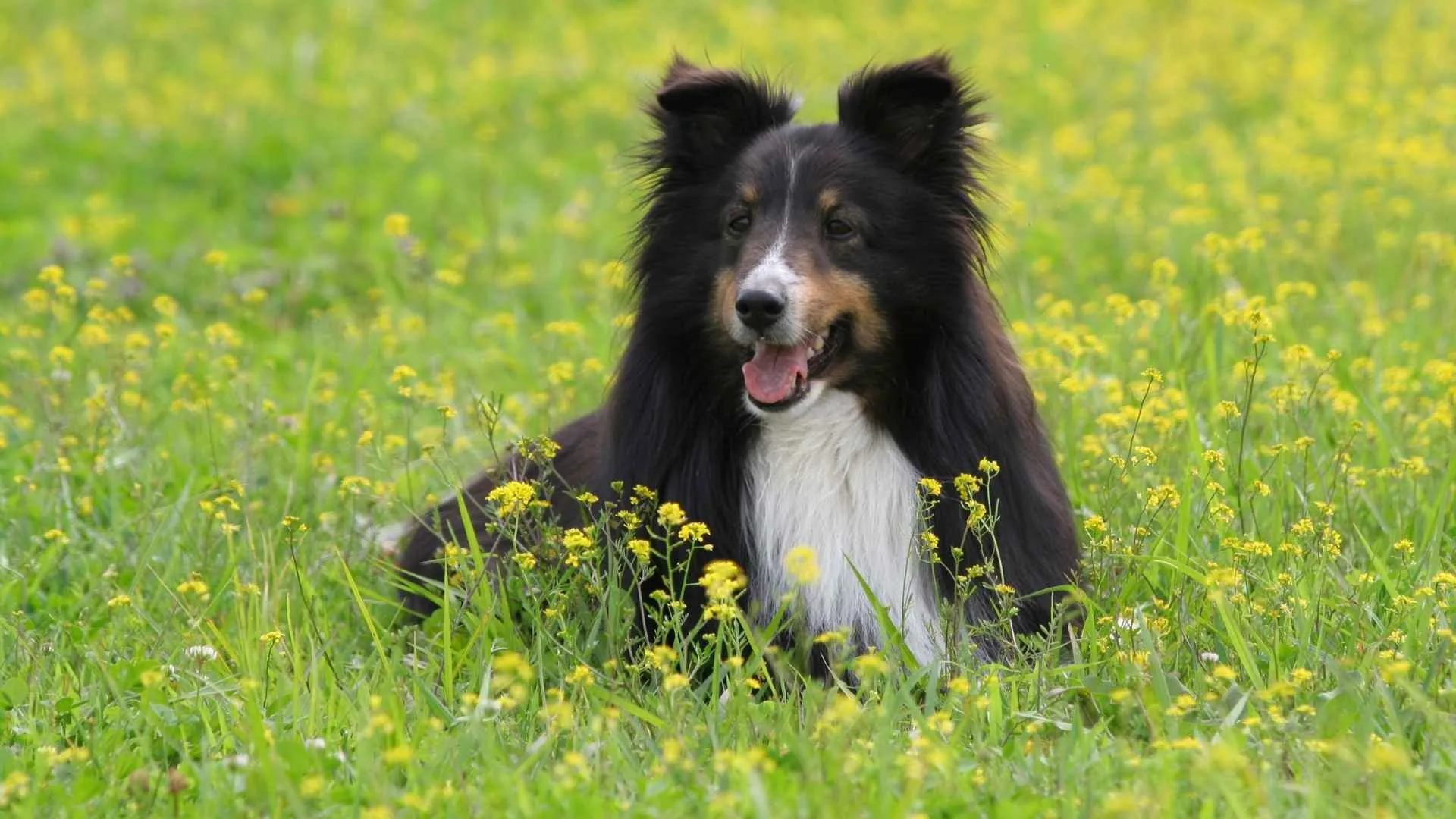
Shetland Sheepdogs, or Shelties, are emotional geniuses in furry form. As herders, their instinct is to care for and guide — so carrying toys mimics protecting their “flock.” Their keen intelligence and deep attachment make them prone to treating toys like family.
Shelties can become over-attached to a favorite toy, especially if they’re anxious or under-stimulated. Regular play and interaction keep this behavior in check.
Signs Your Sheltie Thinks Their Toy Is a Puppy:
Herds or circles around a toy
Carries it from room to room
Gently whimpers when separated from it
Hills Pet explains that with their affectionate loyalty and sharp wit, Shelties pour love into every plush squeaker. Owners should nurture this sweetness with daily bonding and mental enrichment — a happy Sheltie is a confident, toy-loving best friend.
5. Border Collie
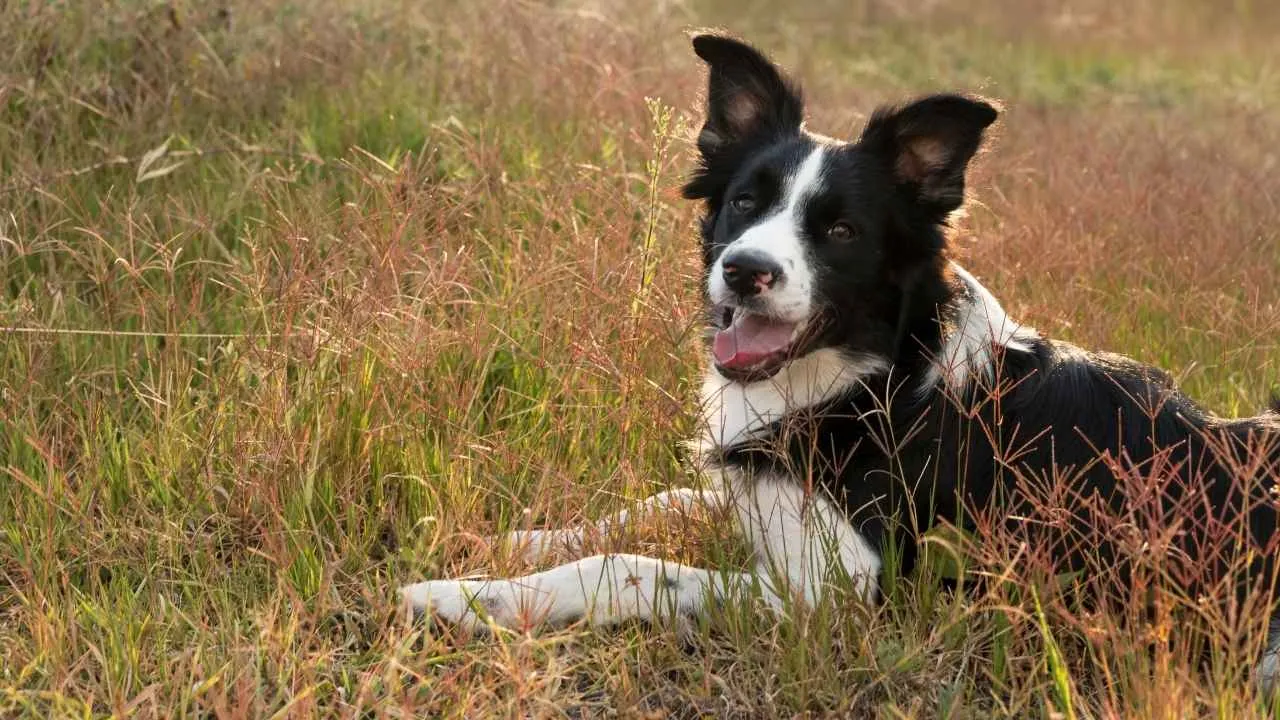
Border Collies are geniuses with boundless energy — and surprisingly tender hearts. Their toy-carrying stems from both herding instincts and deep intelligence.
Studies by the University of Budapest show Border Collies can recognize and name over 100 objects, meaning their toys hold real meaning to them.
This behavior can occasionally turn obsessive if they lack stimulation. Boredom, not emotional distress, is the usual cause.
Signs Your Border Collie Thinks Their Toy Is a Puppy:
Carefully carries toys during downtime
“Protects” or hides them from others
Watches you to ensure the toy’s safety
Their nurturing and focus-driven nature makes them beautifully sensitive dogs. Keep their toy affection healthy with varied activities, puzzle games, and plenty of outdoor adventures — a mentally fulfilled Collie is a joyful, gentle soul.
6. Beagle
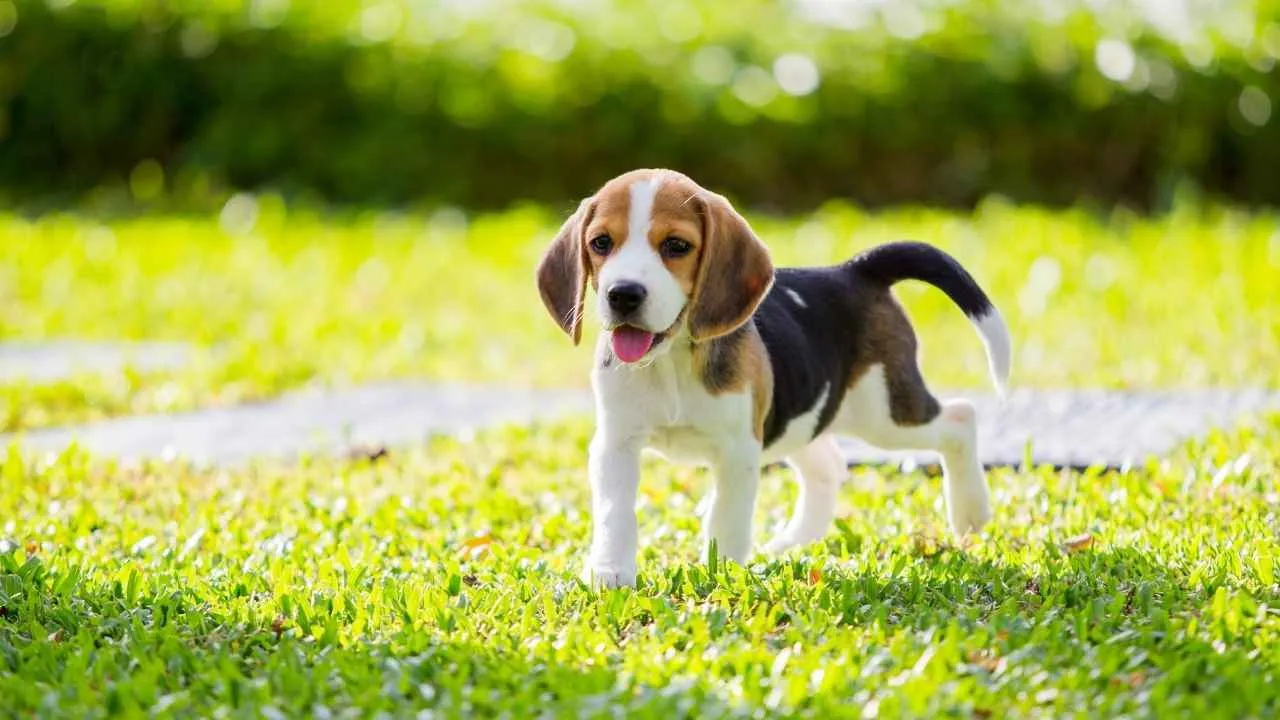
Beagles, with their curious noses and playful spirits, adore their toys — sometimes a little too much! This behavior connects to their hunting roots; carrying a “catch” mimics returning prey to the pack. Over time, that instinct evolved into something sweeter: nurturing their plushies as if they were pups.
If a Beagle carries toys constantly, it may be seeking comfort or attention. It’s not a red flag — just a sign of emotional neediness mixed with charm.
Signs Your Beagle Thinks Their Toy Is a Puppy:
Howls or whines when the toy is taken away
Cradles toys during naps
Bring them proudly to you after “finding” them
Beagles are affectionate and loyal, with hearts as big as their ears. Encourage their caring play with regular exercise and cuddle time — it’s how they bond best with you and their “toy puppies.”
7. Boxer
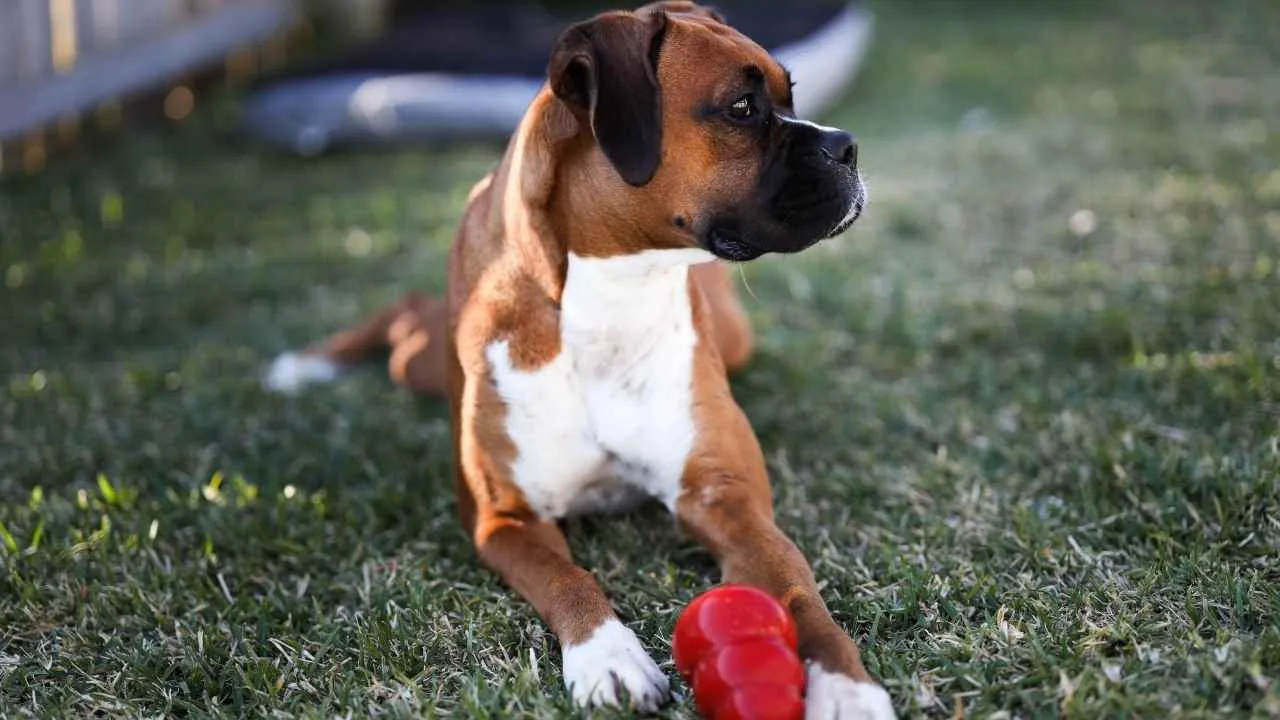
Boxers are the eternal puppies of the dog world — silly, loving, and full of personality. Their habit of carrying toys around like babies often comes from their high emotional sensitivity and protective instincts.
The PetMD describes them as “gentle guardians,” and they often transfer that instinct onto their plush companions.
While Boxers are usually confident, they can develop mild attachment behaviors when bored or lonely. Keeping their environment lively helps balance their affection.
Signs Your Boxer Thinks Their Toy Is a Puppy:
Cradles toys softly and guards them
Bring toys to bed or to family members
Sits calmly, toy in mouth, watching over it
Their nurturing streak is heart-meltingly cute — and perfectly harmless. Give your Boxer durable plush toys and loads of love, and you’ll have a forever friend with the sweetest “parenting” instincts imaginable.
FAQs
1. Why do some dog breeds carry toys around like baby puppies?
Many dogs carry toys as an instinct rooted in nurturing or retrieving behavior. Breeds like Golden Retrievers and Labradors were bred to carry things gently in their mouths, so this habit often mimics caring for “puppies.” It’s also a comforting action that helps them feel secure and loved — just like a child with a favorite stuffed toy.
2. Is it normal for my dog to whine while carrying a toy?
Yes, it’s completely normal! When your dog whines while holding a toy, it often shows emotional excitement or affection. Some female dogs may even act as if they’re protecting or “talking to” their toy, especially during a false pregnancy phase. As long as your pup isn’t showing distress or aggressive behavior, this sweet whining is usually harmless.
3. Can carrying toys be a sign of separation anxiety?
Sometimes, yes. Dogs may cling to or carry toys when left alone for long periods because it helps provide comfort and reduce loneliness. If your own dog does this frequently along with pacing, chewing, or restlessness, it could indicate separation anxiety. In that case, more mental stimulation, enough exercise, and consistent dog training can help your furry friend feel calm and secure.
Conclusion
Every dog has its quirks — from a female dog nurturing her particular toy to most dogs parading their plushies around the household with pride. It’s their natural instinct to care, nurture, and provide comfort, just like a mom would with her child.
If your own dog starts stealing toys or showing obsessive behavior, don’t laugh it off completely — sometimes it’s a sign of pent-up energy or needing more mental stimulation and enough exercise. A fun game of fetch with a tennis ball, proper dog training, or walks around the yard can work wonders.
And while other dogs, Jack Russells, or even other animals may show similar habits, remember — it’s all part of their charm. Be careful, show love, and share your cute stories on Facebook. Because hey, one thing’s for sure: life with pets always brings joy — never sad, always full of fur and laughter.


